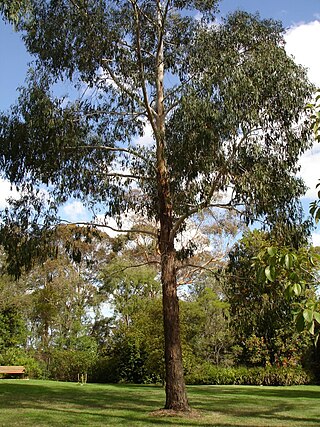
The guenons are Old World monkeys of the genus Cercopithecus. Not all members of this genus have the word "guenon" in their common names; also, because of changes in scientific classification, some monkeys in other genera may have common names that include the word "guenon". Nonetheless, the use of the term guenon for monkeys of this genus is widely accepted.

Carya ovata, the shagbark hickory, is a common hickory native to eastern North America, with two varieties. The trees can grow to quite a large size but are unreliable in their fruit output. The nut is consumed by wildlife and historically by Native Americans, who also used the wood.

Andrachne is a genus of flowering plants in the family Phyllanthaceae described by Linnaeus in 1753. It is one of eight genera in the tribe Poranthereae.

Meineckia is a genus of flowering plants in the family Phyllanthaceae first described as a genus in 1858.

Nepenthes ovata is a tropical pitcher plant endemic to Sumatra. The specific epithet ovata is Latin for "ovate" and refers to the shape of the lower pitchers.

Eucalyptus ovata, commonly known as swamp gum or black gum, is a small to medium-sized tree species that is endemic to south-eastern Australia. It has mostly smooth bark, glossy green, lance-shaped to egg-shaped adult leaves, green flower buds in groups of seven, white flowers and conical to bell-shaped fruit.

Agathis ovata, the mountain kauri, is a species of conifer, genus Agathis in the family Araucariaceae. It is found only on the southwest Pacific island of New Caledonia. It is threatened by habitat loss.

Vertigo ovata, common name the ovate vertigo, is a species of minute, air-breathing land snail, a terrestrial pulmonate gastropod mollusk in the family Vertiginidae, the whorl snails.
Meineckia filipes is a species of plant in the family Phyllanthaceae. It is endemic to the Socotra Islands in the Indian Ocean, part of the Republic of Yemen. Its natural habitats are subtropical or tropical dry forests and subtropical or tropical dry shrubland.
Neraudia ovata, commonly known as Big Island maʻoloa, is a species of flowering plant in the nettle family, Urticaceae, that is endemic to the Big Island of Hawaii. It inhabits dry forests growing on lava flows in the island's Kona District. Big Island maʻoloa is a sprawling shrub with stems 1–3 m (3.3–9.8 ft) long. It is threatened by habitat loss. It is a federally listed endangered species of the United States. There are no more than 18 mature individuals persisting in natural populations, and some individuals which have been planted in appropriate habitat.
Meineckia capillipes is a species of plant in the family Phyllanthaceae. It is endemic to Tanzania. Known locally as Kizeza-mzitu, the plant is small, with white, soft wood. The leaves are simple and alternate, and the flowers and fruit are green. The roots are used medicinally by local peoples for stomach problems.
Meineckia nguruensis is a species of plant in the family Phyllanthaceae. It is endemic to Tanzania.
Meineckia stipularis is a species of plant in the family Phyllanthaceae. It is endemic to Tanzania, found in the Mangalisa forest in the Rubeho Mountains.

The ovate sole is a species of flatfish in the true sole family, Soleidae native to the Indo-Pacific. Solea ovata has eyes on the right side with small scales on the sides of its body (ovata). The total length of its mitogenome is 16,782 bp with 13 protein-coding genes, 22 tRNA genes, and 2 rRNA genes. The organism, Solea Ovata was found in Guangdong province, China. Solea Ovata are usually found in shallow sand and mud at the bottom of water throughout the coast of Indo-Pacific ocean.
Microtropis ovata is a plant in the family Celastraceae. The specific epithet ovata means 'egg-shaped', referring to the leaves.










